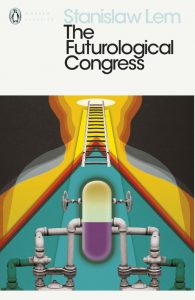The Futurological Congress, Stanislaw Lem, Poland, 1971
 One of the world’s greatest science fiction writers, Stanislaw Lem has with The Futurological Congress produced a short (129 pages) satirical work that can be equated to a roller-coaster ride where, at times, the carriage in which one is riding swerves off the rails and heads for outer space only to suddenly do an about-turn and take a nerve-wracking dive towards the surface of the earth. At all times, in spite of the unpredictability and terror of the ride, there is an underlying logic and intelligence that elevates the book from mere science fiction to great science fiction.
One of the world’s greatest science fiction writers, Stanislaw Lem has with The Futurological Congress produced a short (129 pages) satirical work that can be equated to a roller-coaster ride where, at times, the carriage in which one is riding swerves off the rails and heads for outer space only to suddenly do an about-turn and take a nerve-wracking dive towards the surface of the earth. At all times, in spite of the unpredictability and terror of the ride, there is an underlying logic and intelligence that elevates the book from mere science fiction to great science fiction.
Ijon Tichy is living somewhere in outer space when he is sent back to Earth to attend the Eighth Futurological Congress, which is being held in Costa Rica. Even when he checks in at his hotel there are signs that things are not completely as they should be: an enormous spool of Alpine rope, a ten-foot crowbar and the sign on the door that reads, “This Room Guaranteed BOMB-FREE”.

Of course, there is a revolution and things do get out of hand, and by a series of almost unbelievable events Ijon (together with a number of other futurologists, a few reporters and television commentators, a couple of people who do not seem to belong to anyone, and the girl Friday to the editor of Playboy) ends up in the sewers under the city, where he becomes uncomfortably aware that the water supply has been contaminated by hallucinogenic drugs.
What happens next – Ijon’s helicopter rescue, his assassination and cryopreservation, his waking up in the latter part of the twenty-first century and his attempt to make some sense of the world around him – is unbelievable from a twentieth-century perspective and yet terrifyingly possible from where we are now positioned in the twenty-first century. Robots of all shapes and sizes abound and psycho-chemical drugs are used to create positive experiences: “you take drugs to study, drugs to love, drugs to rise up in revolt, drugs to forget – the distinction between manipulated and natural feelings has ceased to exist.” (page 104). Television is no longer necessary as people are able to experience all that television offers as though it is actually happening to themselves. In fact, drugs for the purpose of blurring the lines between reality and fantasy are administered without the knowledge, or the permission, of the ever-increasing population. People believe that everything is wonderful; the truth is very much the opposite.

I do not want to spoil the ending of this wonderful book, and I will, therefore, leave Ijon in the twenty-first century as he tries to get his head around the overload of new words and new concepts, and as he fights to find the logic in a system that seems to completely defy logic. However, it is worth stopping up for a moment in our headlong rush forwards to ask ourselves just how much of Lem’s futurological vision is already part of our reality, or our perceived reality.
Definitely to be recommended.
(The photo of Lem’s books is from Wikimedia Commons)